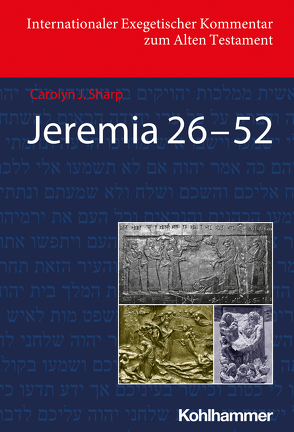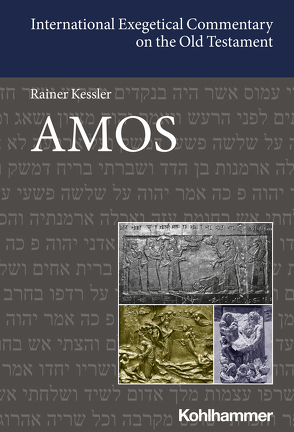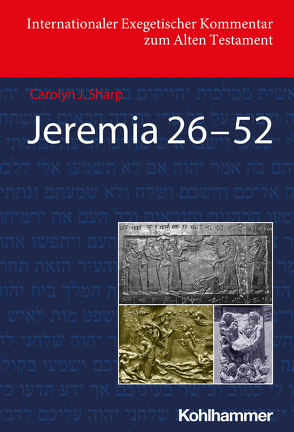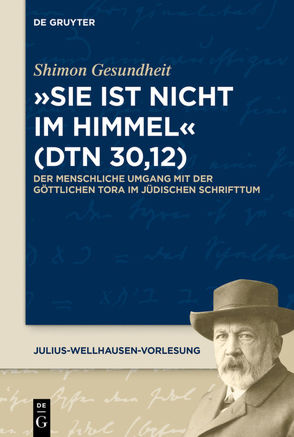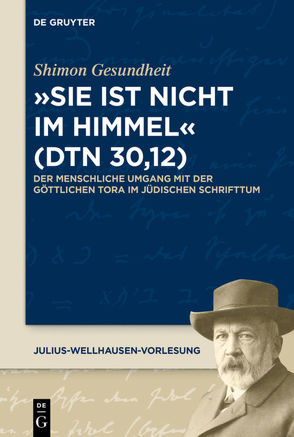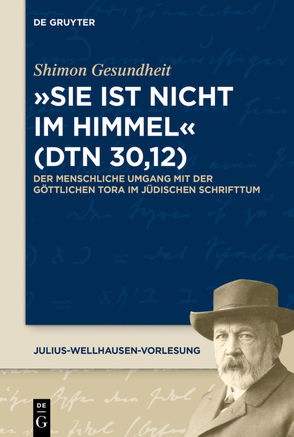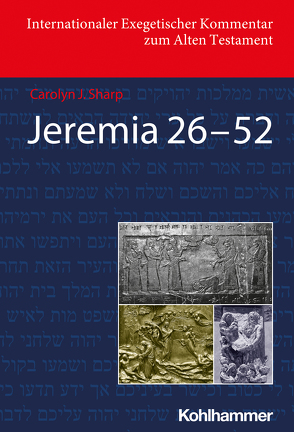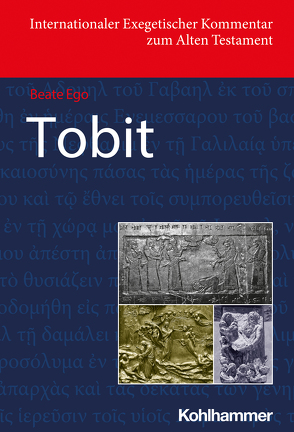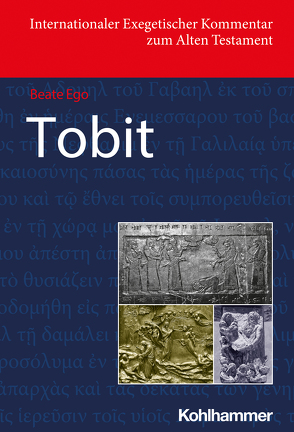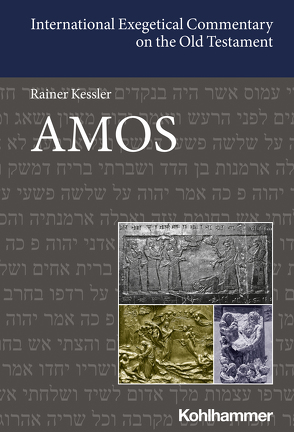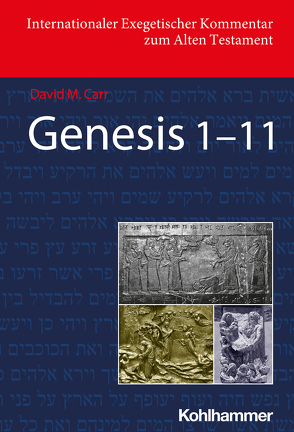In den Jeremia-Überlieferungen finden sich Vorstellungen von Unterwerfung und Widerstand in eigentümlicher Weise verschränkt. Bei der Lektüre begegnen Erzählungen voller Brutalität, Verbündete wie Feinde werden charakterisiert und porträtiert. Das Trauma, das Juda erleidet, spiegelt sich in Prosa, die neubabylonischen Kolonialismus imitiert, in dramatischen Rettungserzählungen und in rachedurstigen Dichtungen. So dient das Schreiben, Lesen und Überliefern selbst zur Verarbeitung und wird zur Quelle von Resilienz. Die historischen und exegetisch-literarischen Betrachtungen des Kommentars werden bereichert durch archäologische Einsichten, feministische Übersetzungspraxis sowie postkoloniale und queere Stimmen.
Aktualisiert: 2023-06-15
Autor:
Gerlinde Baumann,
Adele Berlin,
Erhard Blum,
David M. Carr,
Walter Dietrich,
Beate Ego,
Irmtraud Fischer,
Shimon Gesundheit,
Walter Gross,
Gary N. Knoppers,
Bernard M. Levinson,
Alexander Müller,
Ed Noort,
Carolyn Sharp,
Helmut Utzschneider
This commentary approaches the book of Amos as it is transmitted in the Hebrew Bible: as a collection of the words of a prophet who emerged in the eighth century BCE to proclaim the Kingdom of Israel=s end because of the social and cultic offences of its upper class, but which nonetheless ultimately pronounced a secure future in overwhelming wellness to the catastrophe=s survivors from Judah and Israel. The diachronic analysis retraces the path of the prophetic namesake=s message, which is only still recognizable in contours, through its reworkings at the hands of his first tradents after the end of the Northern Kingdom until its final form, probably from the Persian period.
Aktualisiert: 2023-06-15
Autor:
Adele Berlin,
Erhard Blum,
David M. Carr,
Walter Dietrich,
Beate Ego,
Irmtraud Fischer,
Shimon Gesundheit,
Walter Gross,
Rainer Kessler,
Gary N. Knoppers,
Bernard M. Levinson,
Ed Noort,
David E. Orton,
Helmut Utzschneider
The commentary interprets Jeremiah 1-25 as a dramatic text: In laments, accusations, and announcements of doom, a polyphonic message about the fall of Jerusalem and Judah emerges. The colorful and sometimes disturbing texts deal with a cultural trauma and try to develop an image of God that is capable of explaining history and at the same time conveys hope for a better future. The female personification of Jerusalem provides an emotional and compassionate portrait of the people, giving voice to their experiences of wartime violence and destruction. The persecuted prophet Jeremiah wrestles with God on behalf of the people.
Aktualisiert: 2023-06-15
Autor:
Adele Berlin,
Erhard Blum,
David M. Carr,
Walter Dietrich,
Beate Ego,
Irmtraud Fischer,
Shimon Gesundheit,
Walter Gross,
Gary N. Knoppers,
Bernard M. Levinson,
Christl Maier,
Linda M. Maloney,
Ed Noort,
Helmut Utzschneider
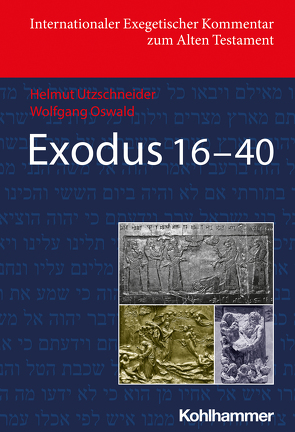
Der Kommentar umfasst den zweiten Teil des Exodusbuches, Ex 15,22-40,38. Er legt den überlieferten hebräischen Text in synchroner Perspektive literarisch und theologisch aus. In Ex 15-18 wird das Gottesverhältnis Israels als Konflikt und Bewährung beschrieben. Am Sinai kommt JHWH seinem Volk in der Tora und im Heiligtum so nahe, dass er sich in seinem Gnadenwillen selbst überwindet.
Diachron werden die Vorgänger-Kompositionen rekonstruiert. Die älteste Erzählung handelt von der Konstitution Israels als Republik mit Dekalog und Bundesbuch als Verfassung. Die Deuteronomisten passen diese Erzählung ihren Gesetzen an, die Priester-Komposition entwirft ein vom Volk gestiftetes Heiligtum. Am Ende erscheint Israel als differenziertes Gemeinwesen, das auf den Säulen Gesetz und Heiligtum ruht. Synthesen reflektieren jeweils das Verhältnis der beiden Auslegungsweisen.
Aktualisiert: 2023-06-07
Autor:
Adele Berlin,
Erhard Blum,
David M. Carr,
Walter Dietrich,
Beate Ego,
Irmtraud Fischer,
Shimon Gesundheit,
Walter Gross,
Gary N. Knoppers,
Bernard M. Levinson,
Alexander Müller,
Ed Noort,
Wolfgang Oswald,
Helmut Utzschneider
In den Jeremia-Überlieferungen finden sich Vorstellungen von Unterwerfung und Widerstand in eigentümlicher Weise verschränkt. Bei der Lektüre begegnen Erzählungen voller Brutalität, Verbündete wie Feinde werden charakterisiert und porträtiert. Das Trauma, das Juda erleidet, spiegelt sich in Prosa, die neubabylonischen Kolonialismus imitiert, in dramatischen Rettungserzählungen und in rachedurstigen Dichtungen. So dient das Schreiben, Lesen und Überliefern selbst zur Verarbeitung und wird zur Quelle von Resilienz. Die historischen und exegetisch-literarischen Betrachtungen des Kommentars werden bereichert durch archäologische Einsichten, feministische Übersetzungspraxis sowie postkoloniale und queere Stimmen.
Aktualisiert: 2023-06-01
Autor:
Gerlinde Baumann,
Adele Berlin,
Erhard Blum,
David M. Carr,
Walter Dietrich,
Beate Ego,
Irmtraud Fischer,
Shimon Gesundheit,
Walter Gross,
Gary N. Knoppers,
Bernard M. Levinson,
Alexander Müller,
Ed Noort,
Carolyn Sharp,
Helmut Utzschneider
Die jüdische Hermeneutik der Tora wird in dieser Studie mittels der Exegese Benno Jacobs und im Vergleich zur literarkritischen Schule Julius Wellhausens beleuchtet. Beispielhaft wird dies anhand von drei Themenblöcken dargestellt: der Kult als Symbolsprache; die Tora als das "wahre praktische Evangelium"; das Studium der Tora als Offenbarung. Im geoffenbarten Gesetz der Tora sah Jacob die "magna charta für Menschenwürde und Völkerglück". Im jüdischen Schrittum wird dieses Gesetz sehr kreativ und theologisch innovativ ausgelegt. Diese Darstellung der jüdischen Hermeneutik richtet sich sowohl an Alttestamentler als auch an Theologen, die am christlich-jüdischen Dialog interessiert sind.
Aktualisiert: 2023-05-29
> findR *
Die jüdische Hermeneutik der Tora wird in dieser Studie mittels der Exegese Benno Jacobs und im Vergleich zur literarkritischen Schule Julius Wellhausens beleuchtet. Beispielhaft wird dies anhand von drei Themenblöcken dargestellt: der Kult als Symbolsprache; die Tora als das "wahre praktische Evangelium"; das Studium der Tora als Offenbarung. Im geoffenbarten Gesetz der Tora sah Jacob die "magna charta für Menschenwürde und Völkerglück". Im jüdischen Schrittum wird dieses Gesetz sehr kreativ und theologisch innovativ ausgelegt. Diese Darstellung der jüdischen Hermeneutik richtet sich sowohl an Alttestamentler als auch an Theologen, die am christlich-jüdischen Dialog interessiert sind.
Aktualisiert: 2023-05-29
> findR *
Die jüdische Hermeneutik der Tora wird in dieser Studie mittels der Exegese Benno Jacobs und im Vergleich zur literarkritischen Schule Julius Wellhausens beleuchtet. Beispielhaft wird dies anhand von drei Themenblöcken dargestellt: der Kult als Symbolsprache; die Tora als das "wahre praktische Evangelium"; das Studium der Tora als Offenbarung. Im geoffenbarten Gesetz der Tora sah Jacob die "magna charta für Menschenwürde und Völkerglück". Im jüdischen Schrittum wird dieses Gesetz sehr kreativ und theologisch innovativ ausgelegt. Diese Darstellung der jüdischen Hermeneutik richtet sich sowohl an Alttestamentler als auch an Theologen, die am christlich-jüdischen Dialog interessiert sind.
Aktualisiert: 2023-05-29
> findR *
In den Jeremia-Überlieferungen finden sich Vorstellungen von Unterwerfung und Widerstand in eigentümlicher Weise verschränkt. Bei der Lektüre begegnen Erzählungen voller Brutalität, Verbündete wie Feinde werden charakterisiert und porträtiert. Das Trauma, das Juda erleidet, spiegelt sich in Prosa, die neubabylonischen Kolonialismus imitiert, in dramatischen Rettungserzählungen und in rachedurstigen Dichtungen. So dient das Schreiben, Lesen und Überliefern selbst zur Verarbeitung und wird zur Quelle von Resilienz. Die historischen und exegetisch-literarischen Betrachtungen des Kommentars werden bereichert durch archäologische Einsichten, feministische Übersetzungspraxis sowie postkoloniale und queere Stimmen.
Aktualisiert: 2023-04-04
Autor:
Gerlinde Baumann,
Adele Berlin,
Erhard Blum,
David M. Carr,
Walter Dietrich,
Beate Ego,
Irmtraud Fischer,
Shimon Gesundheit,
Walter Gross,
Gary N. Knoppers,
Bernard M. Levinson,
Ed Noort,
Carolyn Sharp,
Helmut Utzschneider
The commentary interprets Jeremiah 1-25 as a dramatic text: In laments, accusations, and announcements of doom, a polyphonic message about the fall of Jerusalem and Judah emerges. The colorful and sometimes disturbing texts deal with a cultural trauma and try to develop an image of God that is capable of explaining history and at the same time conveys hope for a better future. The female personification of Jerusalem provides an emotional and compassionate portrait of the people, giving voice to their experiences of wartime violence and destruction. The persecuted prophet Jeremiah wrestles with God on behalf of the people.
Aktualisiert: 2023-04-04
Autor:
Adele Berlin,
Erhard Blum,
David M. Carr,
Walter Dietrich,
Beate Ego,
Irmtraud Fischer,
Shimon Gesundheit,
Walter Gross,
Gary N. Knoppers,
Bernard M. Levinson,
Christl Maier,
Linda M. Maloney,
Ed Noort,
Helmut Utzschneider
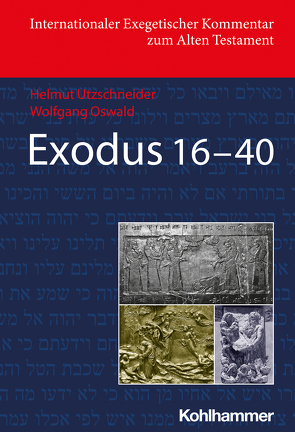
Der Kommentar umfasst den zweiten Teil des Exodusbuches, Ex 15,22-40,38. Er legt den überlieferten hebräischen Text in synchroner Perspektive literarisch und theologisch aus. In Ex 15-18 wird das Gottesverhältnis Israels als Konflikt und Bewährung beschrieben. Am Sinai kommt JHWH seinem Volk in der Tora und im Heiligtum so nahe, dass er sich in seinem Gnadenwillen selbst überwindet.
Diachron werden die Vorgänger-Kompositionen rekonstruiert. Die älteste Erzählung handelt von der Konstitution Israels als Republik mit Dekalog und Bundesbuch als Verfassung. Die Deuteronomisten passen diese Erzählung ihren Gesetzen an, die Priester-Komposition entwirft ein vom Volk gestiftetes Heiligtum. Am Ende erscheint Israel als differenziertes Gemeinwesen, das auf den Säulen Gesetz und Heiligtum ruht. Synthesen reflektieren jeweils das Verhältnis der beiden Auslegungsweisen.
Aktualisiert: 2023-04-04
Autor:
Adele Berlin,
Erhard Blum,
David M. Carr,
Walter Dietrich,
Beate Ego,
Irmtraud Fischer,
Shimon Gesundheit,
Walter Gross,
Gary N. Knoppers,
Bernard M. Levinson,
Alexander Müller,
Ed Noort,
Wolfgang Oswald,
Helmut Utzschneider
This commentary places the ancient Jewish Tobit narrative in the broader context of the history of the tradition by analysing both the ideas it contains about ancient medicine and its conception of the Torah. It also presents a synchronic overall interpretation showing that the narrative is ultimately to be understood in terms of the theology of history. It explaines lucidly the way in which ancient Judaism was able to engage with the threat posed by the aggressive policies of the great empires during the period of Hellenistic rule. In this context, the hymn of praise by the aged Tobit at the end of the narrative in Tob. 13 opens up prospects of hope for those to whom it is addressed.
Aktualisiert: 2023-05-03
Autor:
Adele Berlin,
Erhard Blum,
David M. Carr,
Walter Dietrich,
Beate Ego,
Irmtraud Fischer,
Shimon Gesundheit,
Walter Gross,
Gary N. Knoppers,
Bernard M. Levinson,
Ed Noort,
Helmut Utzschneider
This commentary places the ancient Jewish Tobit narrative in the broader context of the history of the tradition by analysing both the ideas it contains about ancient medicine and its conception of the Torah. It also presents a synchronic overall interpretation showing that the narrative is ultimately to be understood in terms of the theology of history. It explaines lucidly the way in which ancient Judaism was able to engage with the threat posed by the aggressive policies of the great empires during the period of Hellenistic rule. In this context, the hymn of praise by the aged Tobit at the end of the narrative in Tob. 13 opens up prospects of hope for those to whom it is addressed.
Aktualisiert: 2023-05-03
Autor:
Adele Berlin,
Erhard Blum,
David M. Carr,
Walter Dietrich,
Beate Ego,
Irmtraud Fischer,
Shimon Gesundheit,
Walter Gross,
Gary N. Knoppers,
Bernard M. Levinson,
Ed Noort,
Helmut Utzschneider
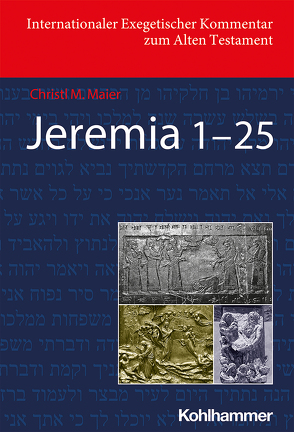
This commentary regards Jer. 1&25 as a dramatic text: in laments, accusations, and predictions of disaster, it issues a polyphonic message on the downfall of Jerusalem and Judah. In accordance with the format of this series, the Hebrew text is initially analysed synchronically in relation to rhetoric, genre, linguistic phenomena, motifs, and theological statements. Against the background of the political situation of Judah from the end of the seventh century BCE, a diachronic analysis attempts to reconstruct the genesis of the text. The starting point for this is the older version of it, preserved in the Greek tradition. The texts, which are rich in imagery and sometimes disturbing, and which set the scene for the downfall of the kingdom of Judah, are interpreted by Maier for contemporary readers with the help of more recent hermeneutical viewpoints such as feminist biblical interpretation, postcolonial theory and trauma research. The way in which the book of Jeremiah seeks to come to terms with cultural trauma & and in the face of war, famine and expulsion, struggles to find an image of God that is capable of explaining history, while at the same time conveying hope for a better future & becomes clear in the process. The female personification of Jerusalem provides an emotional and compassionate portrait of the people, giving voice to their experiences of the violence and destruction of war. Jeremiah, persecuted for his message of doom, is wrestling with God on behalf of the people.
Aktualisiert: 2023-05-03
Autor:
Adele Berlin,
Erhard Blum,
David M. Carr,
Walter Dietrich,
Beate Ego,
Irmtraud Fischer,
Shimon Gesundheit,
Walter Gross,
Gary N. Knoppers,
Bernard M. Levinson,
Christl Maier,
Ed Noort,
Helmut Utzschneider

This commentary regards Jer. 1&25 as a dramatic text: in laments, accusations, and predictions of disaster, it issues a polyphonic message on the downfall of Jerusalem and Judah. In accordance with the format of this series, the Hebrew text is initially analysed synchronically in relation to rhetoric, genre, linguistic phenomena, motifs, and theological statements. Against the background of the political situation of Judah from the end of the seventh century BCE, a diachronic analysis attempts to reconstruct the genesis of the text. The starting point for this is the older version of it, preserved in the Greek tradition. The texts, which are rich in imagery and sometimes disturbing, and which set the scene for the downfall of the kingdom of Judah, are interpreted by Maier for contemporary readers with the help of more recent hermeneutical viewpoints such as feminist biblical interpretation, postcolonial theory and trauma research. The way in which the book of Jeremiah seeks to come to terms with cultural trauma & and in the face of war, famine and expulsion, struggles to find an image of God that is capable of explaining history, while at the same time conveying hope for a better future & becomes clear in the process. The female personification of Jerusalem provides an emotional and compassionate portrait of the people, giving voice to their experiences of the violence and destruction of war. Jeremiah, persecuted for his message of doom, is wrestling with God on behalf of the people.
Aktualisiert: 2023-05-03
Autor:
Adele Berlin,
Erhard Blum,
David M. Carr,
Walter Dietrich,
Beate Ego,
Irmtraud Fischer,
Shimon Gesundheit,
Walter Gross,
Gary N. Knoppers,
Bernard M. Levinson,
Christl Maier,
Ed Noort,
Helmut Utzschneider
This commentary approaches the book of Amos as it is transmitted in the Hebrew Bible: as a collection of the words of a prophet who emerged in the eighth century BCE to proclaim the Kingdom of Israel=s end because of the social and cultic offences of its upper class, but which nonetheless ultimately pronounced a secure future in overwhelming wellness to the catastrophe=s survivors from Judah and Israel. The diachronic analysis retraces the path of the prophetic namesake=s message, which is only still recognizable in contours, through its reworkings at the hands of his first tradents after the end of the Northern Kingdom until its final form, probably from the Persian period.
Aktualisiert: 2023-04-04
Autor:
Adele Berlin,
Erhard Blum,
David M. Carr,
Walter Dietrich,
Beate Ego,
Irmtraud Fischer,
Shimon Gesundheit,
Walter Gross,
Rainer Kessler,
Gary N. Knoppers,
Bernard M. Levinson,
Ed Noort,
Helmut Utzschneider
Carr analysiert die biblische Urgeschichte eng am Text und ordnet sie zugleich in den Kontext des Alten Orients ein. Die Interpretation der bedeutungsschweren und vielschichten Erzählungen wird jeweils eingeleitet von einer annotierten Übersetzung sowie einem Blick auf Entstehung und Vorstufen des tradierten Textes. Daran schließt sich die Auslegung des Endtextes an, die alte und neue exegetische Einsichten verbindet und dabei auch feministische, queere, ökologische und andere Zugänge berücksichtigt.
Aktualisiert: 2023-04-04
Autor:
Gerlinde Baumann,
Adele Berlin,
Erhard Blum,
David M. Carr,
Walter Dietrich,
Beate Ego,
Irmtraud Fischer,
Shimon Gesundheit,
Walter Gross,
Gary N. Knoppers,
Bernard M. Levinson,
Ed Noort,
Helmut Utzschneider
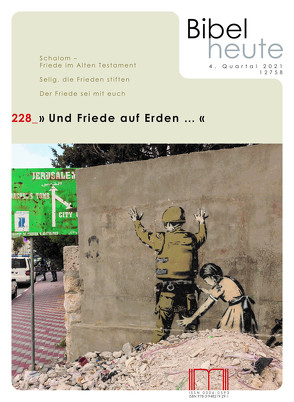
Alle Jahre wieder hören wir zum Weihnachtsfest die Botschaft der Engel auf den Hirtenfeldern von Betlehem: „Friede auf Erden den Menschen“. Und denken wahrscheinlich dabei: Das wäre schön! In Betlehem gab es zur Zeit der Geburt Jesu keinen Frieden: die Römer hielten das Land besetzt. Auch heute ist Betlehem besetzt, und der Friede fehlt. Dieser Spannung zwischen biblischer Botschaft und bedrückendem Alltag geht dieses „Bibel heute“-Heft nach. Und es kommen Christinnen und Christen zu Wort, die bis heute im Heiligen Land Frieden stiften und Frieden suchen: die Friedensarbeiterin Nora Carmi etwa, oder Sani Ibrahim „Charly“ Azar, der Bischof der evangelisch-lutherischen Kirche in Jordanien und im Heiligen Land. Wie verstehen sie den christlichen Friedensauftrag?
Aktualisiert: 2021-11-25
Autor:
Walter Achermann,
Sani Ibrahim "Charly" Azar,
Dieter Bauer,
Nora Carmi,
Eugen Drewermann,
Claudio Ettl,
Shimon Gesundheit,
Wolfgang Gramer,
Hanns Dieter Hüsch,
Joachim Kügler,
Thomas Nauerth,
Irmela Redhead,
Wiltrud Rösch-Metzler,
Till Magnus Steiner
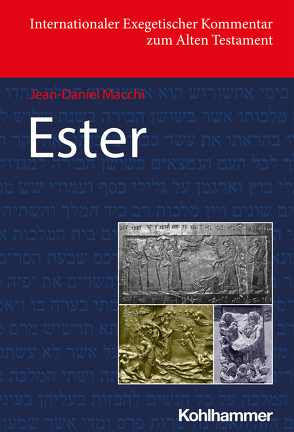
Das Buch Ester gehört zu den fünf Festrollen, den Megillot. Es berichtet von einer jungen Israelitin, die im persischen Reich zur Königin aufsteigt und ihr Volk vor einem Genozid bewahrt. Diese Geschichte ist der Ausgangspunkt des Purim-Festes, das Juden in aller Welt bis heute feiern.
Der Kommentar bietet eine Literarkritik des Textes und analysiert die Komposition der unterschiedlichen Perikopen ebenso wie Erzählweise, Stil, Syntax und Vokabular.
Macchi zeigt, wie das Buch auf biblischen und außerbiblischen Texten und Traditionen basiert und mit ihnen im Gespräch ist, und charakterisiert auf dieser Grundlage den Redaktionsprozess und die historischen und sozialen Kontexte, in denen Autoren und Redaktoren des Buches arbeiteten.
Aktualisiert: 2023-05-02
Autor:
Adele Berlin,
Erhard Blum,
David M. Carr,
Walter Dietrich,
Beate Ego,
Irmtraud Fischer,
Shimon Gesundheit,
Walter Gross,
Gary N. Knoppers,
Bernard M. Levinson,
Jean-Daniel Macchi,
Ed Noort,
Norbert Reck,
Helmut Utzschneider
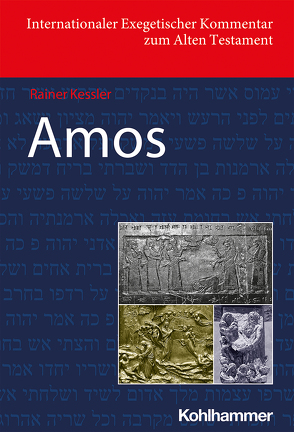
This commentary interprets the book of Amos as handed down in the Hebrew Bible: as a collection of the words of a prophet who emerges in the eighth century BCE and proclaims the end of the kingdom of Israel due to the social and ritual transgressions of its upper class, but in the end announces a safe future in abundant prosperity for survivors of the catastrophe from Judah and Israel. Diachronic analysis traces a path from the message of the eponymous prophet, which is recognizable only in outline, through the adaptations made by the first transmitters of the text following the end of the northern kingdom of Israel, to the final figure, who probably dates from the Persian era. Texts witnessing to the reception of the book & from other Old Testament writings to the present day & presented in highlights.
Aktualisiert: 2023-05-03
Autor:
Adele Berlin,
Erhard Blum,
David M. Carr,
Walter Dietrich,
Beate Ego,
Irmtraud Fischer,
Shimon Gesundheit,
Walter Gross,
Rainer Kessler,
Gary N. Knoppers,
Bernard M. Levinson,
Ed Noort,
Helmut Utzschneider
MEHR ANZEIGEN
Bücher von Gesundheit, Shimon
Sie suchen ein Buch oder Publikation vonGesundheit, Shimon ? Bei Buch findr finden Sie alle Bücher Gesundheit, Shimon.
Entdecken Sie neue Bücher oder Klassiker für Sie selbst oder zum Verschenken. Buch findr hat zahlreiche Bücher
von Gesundheit, Shimon im Sortiment. Nehmen Sie sich Zeit zum Stöbern und finden Sie das passende Buch oder die
Publiketion für Ihr Lesevergnügen oder Ihr Interessensgebiet. Stöbern Sie durch unser Angebot und finden Sie aus
unserer großen Auswahl das Buch, das Ihnen zusagt. Bei Buch findr finden Sie Romane, Ratgeber, wissenschaftliche und
populärwissenschaftliche Bücher uvm. Bestellen Sie Ihr Buch zu Ihrem Thema einfach online und lassen Sie es sich
bequem nach Hause schicken. Wir wünschen Ihnen schöne und entspannte Lesemomente mit Ihrem Buch
von Gesundheit, Shimon .
Gesundheit, Shimon - Große Auswahl an Publikationen bei Buch findr
Bei uns finden Sie Bücher aller beliebter Autoren, Neuerscheinungen, Bestseller genauso wie alte Schätze. Bücher
von Gesundheit, Shimon die Ihre Fantasie anregen und Bücher, die Sie weiterbilden und Ihnen wissenschaftliche Fakten
vermitteln. Ganz nach Ihrem Geschmack ist das passende Buch für Sie dabei. Finden Sie eine große Auswahl Bücher
verschiedenster Genres, Verlage, Schlagworte Genre bei Buchfindr:
Unser Repertoire umfasst Bücher von
Sie haben viele Möglichkeiten bei Buch findr die passenden Bücher für Ihr Lesevergnügen zu entdecken. Nutzen Sie
unsere Suchfunktionen, um zu stöbern und für Sie interessante Bücher in den unterschiedlichen Genres und Kategorien
zu finden. Neben Büchern von Gesundheit, Shimon und Büchern aus verschiedenen Kategorien finden Sie schnell und
einfach auch eine Auflistung thematisch passender Publikationen. Probieren Sie es aus, legen Sie jetzt los! Ihrem
Lesevergnügen steht nichts im Wege. Nutzen Sie die Vorteile Ihre Bücher online zu kaufen und bekommen Sie die
bestellten Bücher schnell und bequem zugestellt. Nehmen Sie sich die Zeit, online die Bücher Ihrer Wahl anzulesen,
Buchempfehlungen und Rezensionen zu studieren, Informationen zu Autoren zu lesen. Viel Spaß beim Lesen wünscht Ihnen
das Team von Buchfindr.
